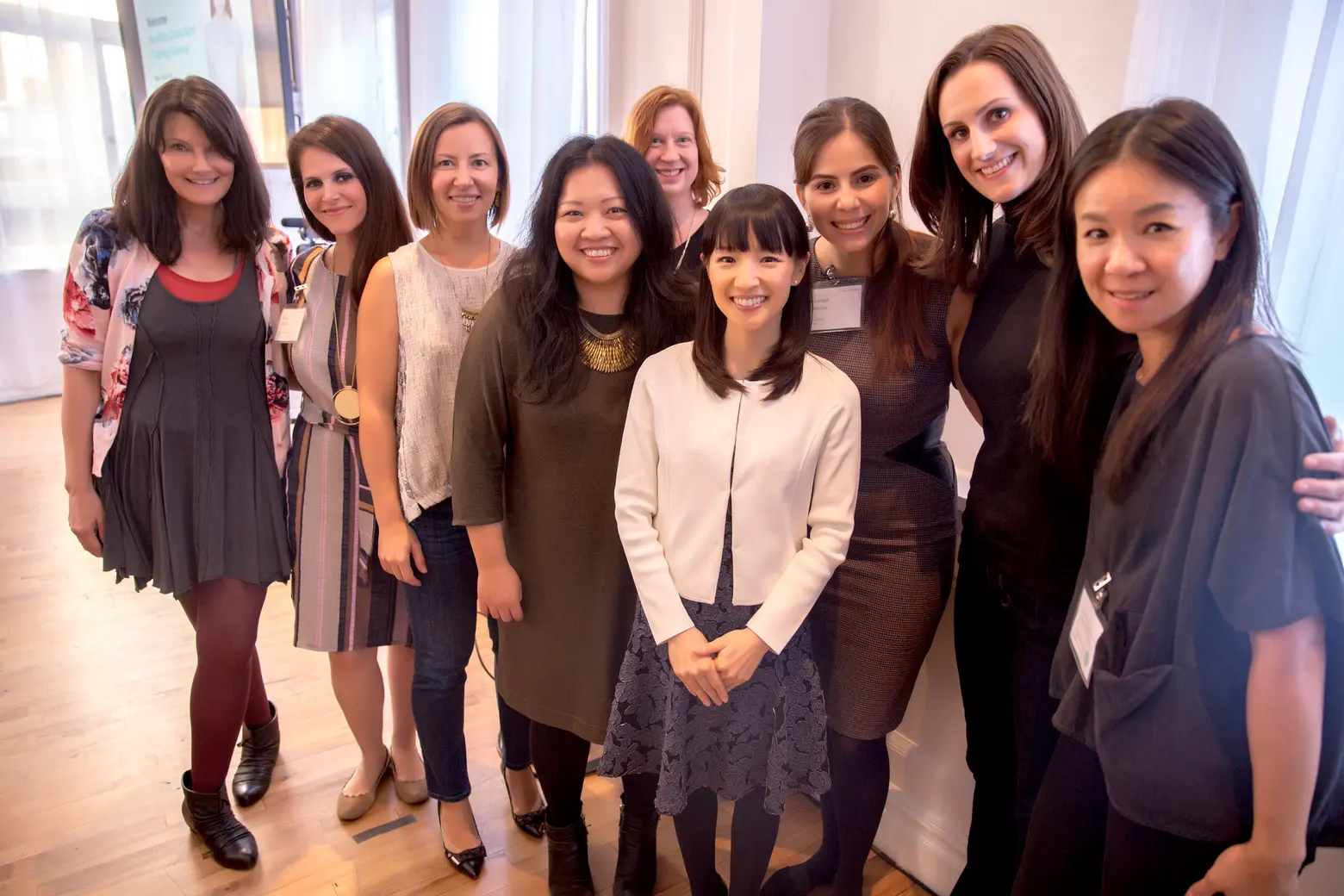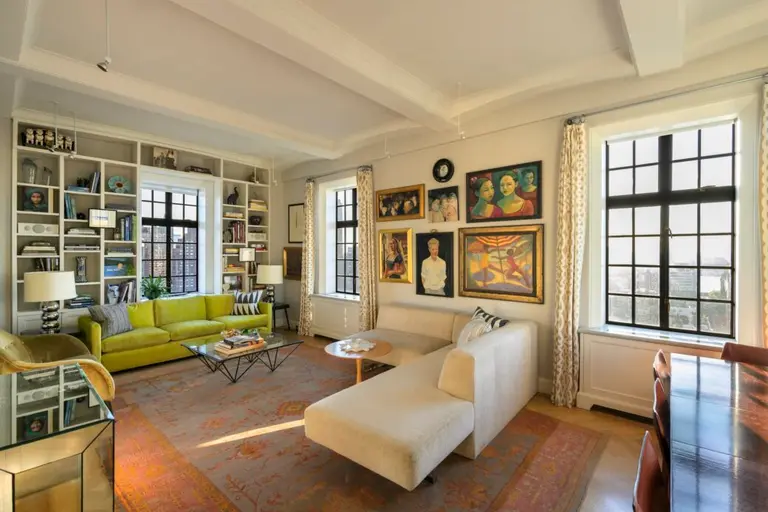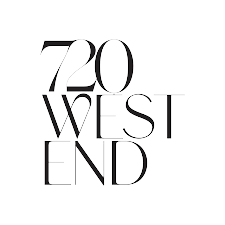Ready to ‘tidy up’ your apartment? Meet NYC’s master KonMari consultant

Closet photo via Flickr cc; Photo of Karin and Marie courtesy of Karin Socci
Between her best-selling book, “The Life-Changing Magic of Tidying Up: The Japanese Art of Decluttering and Organizing,” and new Netflix show, “Tidying Up,” over the past five years, Marie Kondo—a diminutive Japanese organizing guru—has changed how people around the world think about decluttering their homes. But Kondo isn’t just another interior designer offering tips on storage. She believes that one’s home has a direct impact on their lives and even their personal relationships. This is why she approaches tidying from the heart and not simply the mind. As she says on her website, “Keep only those things that speak to the heart, and discard items that no longer spark joy.”
With so many of us living in homes that are almost as tiny as those in Tokyo where Kondo is based and developed her method, it’s no surprise that New Yorkers have been eagerly embracing Kondo’s advice. It is also likely no coincidence that one of the only certified Master KonMari consultants in North America, Karin Socci, happens to serve the New York City area. 6sqft recently reached out to Socci, founder of The Serene Home, to learn more about the KonMari method and how she helps New Yorkers put it into practice.

Photo via Pexels
6sqft: In a few sentences, how would you sum up the KonMari method for anyone who doesn’t already know about it?
Karin Socci: KonMari is a lifestyle method or organizing that asks you to evaluate the things you have in your home on the basis of whether you find them to be especially useful or especially beautiful/meaningful. Those are the things that we say Spark Joy! Things are divided into five categories (clothing, books, papers, miscellaneous, and sentimental) and sorted by category instead of location (bedroom, kitchen etc.) so that you get a full sense of what you have. Once items have been sorted, they are organized so that they are easy to see, easy to get to, and easy to put away. Most people find that by doing this method from top to bottom, things stay organized for the most part. Once your things are organized, the idea is that day to day life is a little calmer and a little more relaxed.
 Karen, on the far left, joins other certified consultants at a KonMari Consultant event last year in Manhattan. Photo courtesy of Karin Socci.
Karen, on the far left, joins other certified consultants at a KonMari Consultant event last year in Manhattan. Photo courtesy of Karin Socci.
How does one become a certified KonMari consultant?
KS: There’s a process that includes demonstrating that you have KonMari’ed your home, attending an intensive seminar, submitting reports on at least 10 practice clients and then passing an exam. All along the way, KMI is providing feedback and suggestions.
Have you actually met Maria Kondo?
KS: Yes! I have met Marie several times! Not only at the seminars, but I have been involved in media events with her. She’s just like the series shows her: very serene and a little shy, but very open and compassionate.
What are some of the specific challenges that New Yorkers face when it comes to organizing their homes?
KS: Great question! Space is obviously the main thing. Every square inch of an NYC apartment is super valuable. You are paying a lot for it in rent, mortgage, maintenance, insurance, heating, cooling, and so on. So, it’s even more important that you are certain that each item has “earned” its space by being beautiful, useful or meaningful. Do you really want to devote a foot of counter top to the waffle maker you use once a year? If you love shoes, how much space are you okay with devoting to them? Those are questions that people with suburban homes don’t have to answer as brutally. I have clients all the time who say, “I love all these things, but I will narrow it down because I also want to be able to function in my apartment.” All space used for storage cannot be used for activities.
Hypothetically, let’s say a client comes to you for help—a family of four living in a converted one bedroom in Manhattan—about 750 square feet for four people including two children. If they are going to invest in three or four storage solutions, which ones would you recommend?
KS: In KonMari, this is a question that can only be answered once things are sorted. We avoid deciding about organizational items until we know exactly what is needed in the space for day to day activities. The first thing I say when people ask me this is beware the big container stores! Bed Bath & Beyond and the Container Store are Disneylands for cramped quarters. They have a very tempting solution for every problem, but shoving unneeded things into pretty bins is not the solution.
Now, having said that, there is a place for good storage equipment, and in this case, I would advise the family to have a dedicated basket or bin for each person. This should become the go-to drop off for bags, books, papers that will be leaving the house in the morning as each person starts their day. These can be stacking or not, but each basket should be a respected space. Each person should sort their basket each week to remove things no longer needed. This will prevent some morning chaos.
Also, think vertically! Use every foot of space up high. Put up shelves and use high spaces for things not needed as often and then invest in folding footstools. Use all space easily reachable for things needed most often. This is your prime real estate and only things that are needed most often should be within reach.
Finally, use boxes or little bins inside of drawers to separate items. I see underwear, socks, and tee shirts jumbled up in the same drawer so often. Not only is it hard to find things, but it’s not a very pleasant sight when you are getting ready for the day.
Are there any benefits to living in a smaller but more orderly home? Are New Yorkers actually gaining something by being forced to live in smaller spaces, even with children?
KS: I think everyone would answer this question differently, but in KonMari, we always return to the vision of striving to live your ideal life. Do the benefits of living in NYC outweigh the possible benefits of begin able to own more stuff? If you honestly ask yourself how many things you really need or use each day, you would probably acknowledge that most of the things you own fall into the category of “maybe someday I will need this” or “I need this only once in a great while”. So, I think that the decision about whether living in NYC is an overall benefit depends on whether you are living the life you want to live here or not. I work with lots of families who live in very large homes outside of the city, and they also find themselves swimming in stuff and feeling cramped. Space is a vacuum and easy to fill. But there is enormous satisfaction in the feeling that you are sharing your home with just the right number of things.
How and when did you start your business and what services do you offer?
KS: The Serene Home opened in 2016 after I found my calling. I started my professional life in psychotherapy and healthcare finance but wanted to get out from behind a desk and work with people in a more personal way. I discovered KonMari, went through the certification process and began working with people and families throughout the NYC area. My services are primarily in the home, hands-on, KonMari organizing, although I also provide practical interior design. I do offer virtual organizing for some clients, especially if they are far away, and I also teach classes in Westchester each season and do presentations and workshops.
RELATED:




























